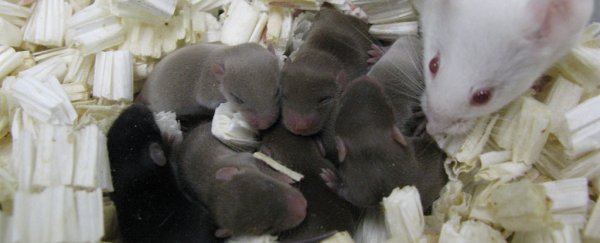Mouse sperm that spent more than nine months in orbit have been used to produce a litter of healthy mice, giving hope that mammalian reproduction in space colonies could one day be possible.
While humanity is already pretty obsessed with the idea of getting off this rock and exploring the big, wide Universe out there, the fact is we understand very little about how sexual reproduction will fare once we leave Earth behind, which is why the results of this Japanese "Space Pup" experiment are so promising.
"The purpose of our project is to know whether mammalian reproduction is possible in space or not," biotechnologist Teruhiko Wakayama from the University of Yamanashi told The Guardian.
"Our results demonstrate that generating human or domestic animal offspring from space-preserved spermatozoa is a possibility, which should be useful when the 'space age' arrives."
Wakayama's team dispatched samples of freeze-dried mouse sperm that was stored on the International Space Station (ISS) for 288 days in between August 2013 and May 2014.
 Teruhiko Wakayama/University of Yamanashi
Teruhiko Wakayama/University of Yamanashi
During that time, the researchers say the samples would have been subjected to approximately 100 times as much cosmic radiation as on Earth's surface.
When they returned from the ISS, the samples were compared with sperm that had spent the duration of the voyage stored in an Earth bound lab in similar conditions (at –95°C, –139°F).
The comparison showed that their time in orbit had indeed had an effect on the ISS samples, revealing traces of slight DNA damage when compared with the control specimens.
But when the freeze-dried samples were reconstituted with water – something that's not yet possible with human sperm – and used to impregnate female mice via in vitro fertilisation (IVF), the litter of space pups were healthy.
The team reports that not only were the birth rates and male-to-female ratios normal, but they also showed only minor genetic differences to mice born from Earth-based samples.
The fact that the DNA damage didn't end up harming the space pups suggests that whatever damage was incurred by the extra radiation levels aboard the ISS was somehow repaired after fertilisation, at some point during the embryonic stage.
What's more, when the space pups became mature, they exhibited normal fertility, having healthy offspring of their own.
It's a sound victory as far as samples of freeze-dried mouse sperm go – and it adds to our understanding of how reproduction processes are affected by prolonged space exposure.
But other researchers say we shouldn't necessarily think that these results would also extend to healthy human reproduction in space – especially since the experiment only looked at IVF and gestation after the samples were returned safely to Earth, with ordinary radiation and gravity conditions.
"No one got pregnant in space and had the baby," pharmacologist Dorit Donoviel from the Centre for Space Medicine at Baylor University, who wasn't involved with the study, told The Verge.
"An ideal experiment would be to really have mice mate and deliver a litter of pups in space, and I don't even know if the mating is even feasible for mice in zero gravity."
There's also the question of radiation levels that the mice were exposed to on board the ISS, which enjoys the protection of Earth's Van Allen belts, which shield the planet from the most dangerous high-energy radiation.
"When long-term space habitation or travel resumes to the Moon and beyond outside the protection of the Van Allen belts, high-energy radiation exposures from iron atoms will cause extreme direct and secondary damage to DNA, RNA, proteins and lipids," reproduction specialist Joseph Tash from the University of Kansas, who wasn't involved with the research, told ABC News.
"The damage from high-energy radiation is much more difficult to repair and, as the authors suggest, is likely to be beyond the repair capabilities of the oocyte or developing embryo."
So while it's certainly a promising start to see a litter of healthy space pups delivered, there's a lot more research to be done before we come close to understanding how long-duration space travel and off-world living will affect human reproduction – particularly given what we know about how space impacts astronaut health.
"We've got our hands full just keeping adults healthy," Donoviel told The Verge. "The last thing I want to worry about is a baby who is going to be a lot more vulnerable."
The findings are reported in Proceedings of the National Academy of Sciences.
